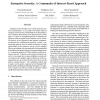Free Online Productivity Tools
i2Speak
i2Symbol
i2OCR
iTex2Img
iWeb2Print
iWeb2Shot
i2Type
iPdf2Split
iPdf2Merge
i2Bopomofo
i2Arabic
i2Style
i2Image
i2PDF
iLatex2Rtf
Sci2ools
NDSS
2006
IEEE
2006
IEEE
Enterprise Security: A Community of Interest Based Approach
Enterprise networks today carry a range of mission critical communications. A successful worm attack within an enterprise network can be substantially more devastating to most companies than attacks on the larger Internet. In this paper we explore a brownfield approach to hardening an enterprise network against active malware such as worms. The premise of our approach is that if future communication patterns are constrained to historical “normal” communication patterns, then the ability of malware to exploit vulnerabilities in the enterprise can be severely curtailed. We present techniques for automatically deriving individual host profiles that capture historical communication patterns (i.e., community of interest (COI)) of end hosts within an enterprise network. Using traces from a large enterprise network, we investigate how a range of different security policies based on these profiles impact usability (as valid communications may get restricted) and security (how well the ...
Communication Patterns | Computer Networks | Enterprise Network | Large Enterprise Network | NDSS 2006 |
Related Content
| Added | 12 Jun 2010 |
| Updated | 12 Jun 2010 |
| Type | Conference |
| Year | 2006 |
| Where | NDSS |
| Authors | Patrick Drew McDaniel, Subhabrata Sen, Oliver Spatscheck, Jacobus E. van der Merwe, William Aiello, Charles R. Kalmanek |
Comments (0)

